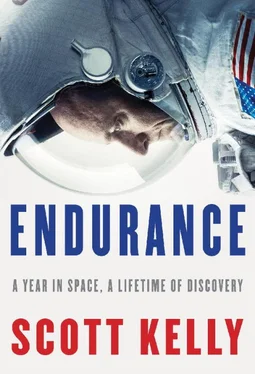When Samantha opens the ISS hatch that leads to the Dragon and slides it out of the way, an unmistakable smell hits me—slightly burned, slightly metallic—the smell of space. Samantha smiles at me when she recognizes it. She has smelled it before, when her earlier crewmates went through a process similar to this one to open the hatch on her Soyuz, and again when two of her crewmates did a spacewalk.
We remove and stow a canvas covering that protects the hatch. Then Samantha and I work together to remove the four assemblies that power the latches and bolts that mated the two spacecraft together. It’s a long, involved procedure to remove and properly cap all the connectors. The biggest risk here is damaging one of the connectors or losing a cap, troublingly easy to do when everything is floating around. We connect cables for power and data between the two spacecraft.
We tell the ground that we have successfully completed these steps.
“Station, Houston on Space to Ground Two, you have a go for step six, ingressing Dragon,” capcom tells us.
“Copy that.”
We put on goggles and dust masks before opening Dragon’s hatch to protect us from dust and debris that might be floating inside. Samantha opens the hatch and slides it aside, then turns on the light inside Dragon. The first task is to make sure the air gets mixed between the two spacecraft—there is some danger that Dragon could be harboring a pocket of CO 2or some other gas, and without gravity to keep the air constantly mixing, we have to install vent lines that will keep air circulating here as it does in the rest of the station. We take samples of the air inside Dragon to send back for analysis on Earth, and the Russians take their own sample (because NASA has sometimes questioned the Russian space agency’s atmospheric standards, they insist on testing our air as well). We visually inspect the area around both hatches to make sure nothing has been damaged. These berthing ports have been used over and over again, and I’m amazed that so far none of them has failed or shown any signs of wear. Everything has gone just as planned, and we now have 4,300 pounds of cargo to unload.
Our care packages are clearly marked and easily accessible once we open the hatch, as are the mice, the fresh food, and ice cream. Terry and I distribute the packages to everyone, feeling a bit like Santa Claus. These items were gathered from our families and friends months ago in order to be packed into the Dragon. Care package items need to be small, light, and nonperishable. I leave mine in my CQ to open in private later.
The fresh food bags contain apples, pears, red and green peppers. They smell great. We will eat them at nearly every meal for the next few days before they spoil.
I unpack the live mice and transfer them, one by one, from the habitat they launched in to their larger, more comfortable facility in the U.S. lab. They scramble around, trying to make sense of weightlessness. I watch their faces and wonder if their tiny brains can process the change they have experienced. Like people, they’re not looking too good at first.
All the cargo we unload from Dragon must be packed into labeled fabric bags. The labels have bar codes, just like food in a grocery store, as well as printed text indicating what’s in each. Everything has a purpose and a destination—not only to go to a certain module, but to go in a specific bag or locker on a specific wall (or floor or ceiling) of that module. It’s so easy to lose stuff up here that if we were to put something in the wrong place, we may never see it again. This makes the work of unpacking Dragon both tedious and stressful, a combination that seems to occur a lot on the International Space Station. After spending a few hours at the interface between Dragon and ISS, I notice that my arms smell like space.
—
SINCE IT’S SATURDAY, I have a bit more time to make personal phone calls to friends and family. I’ve found myself thinking about my mother today—it’s been three years since she died, and though I’m not usually especially attuned to dates and anniversaries, I’m wishing she could see what I’m doing up here. She was so proud of Mark and me when we became astronauts, and she came to all six of our launches in Florida. The further I’ve gone in my career, the clearer it seems to me that the early lessons she taught Mark and me by example have made a huge difference in my life. Seeing her set herself an incredibly tough goal—to pass the men’s physical fitness test to join the police department—and then to conquer it, was worth more than all the pep talks in the world. I remember watching her post her workout schedule on the fridge, detailing which days she would lift how much weight or how far she would run. As the weeks went by and more of those workouts were crossed out, we saw her get stronger. Her accomplishment wasn’t meant to be instructional for Mark and me, but it was.
All the stories I’ve heard about my mother’s years on the police force made me believe she was the best kind of cop. She truly cared about the people she interacted with, even if they were doing dumb stuff, and she put their safety ahead of her own. She could often defuse a situation by listening rather than threatening, and she made compassionate judgments when it might have been easier to arrest an offender. She hated to take people to jail and would often come home late because she had driven someone home herself instead. My mother sustained a lot of injuries on the job. After ten years, her back ailments had become serious enough that she retired on a disability pension and didn’t work again. She wasn’t sorry to leave; she had found police work very demanding, though she was proud of her service and we were proud of her. She was happy to fill her time with her artwork and, later, her grandchildren.
When I get a chance to float into my CQ, I see that Amiko has emailed me. She put some flowers on my mother’s grave today and took a picture to include in the email. Seeing my mother’s name on her gravestone, the bright colors of the flowers, the green of the grass all around—I’m pulled back to Earth all at once. The image reminds me both of the simple wonder of things like flowers and grass and also of the fact that we have to lose the people we love most. Most of all, I’m moved by Amiko’s gesture. She has a lot to deal with on the weekends, but she remembered this date and drove out to the cemetery to do this because I couldn’t.
“Thanks for doing that,” I tell her when I call. “That means a lot to me.” There was more I wanted to say but I can’t quite put it into words. Amiko was with me at the end of my mother’s life. She was with me when I learned I would be going on this mission. She knows, more than anyone but my brother, what it would mean to my mother to see what I’m doing now.
“I remembered what I wanted to tell you,” I say. “I spent all day getting into SpaceX, and now my arms smell like space.”
“That’s so cool,” Amiko says. “Tell me what it smells like.” She knows, because I’ve told her before. She listens again.
We continue to unpack Dragon on Sunday. I work through a few bags of medical supplies, clothes, and food. I’m taking a break to do some cleaning—it’s still Sunday, after all—and not long afterward I hear a fire alarm.
Astronauts do not scare easily, and this alarm does not exactly scare me, but it certainly gets my attention. Fire is on the short list of things that can kill you in space incredibly quickly. A fire on the old Russian space station Mir blinded and choked the crew within seconds, and if it hadn’t been for their quick reaction they could have died. Some of the older cosmonauts, including Gennady, refuse to cut their hair in space, because Sasha Kaleri was cutting his hair when the fire started on Mir. I know as I hear the first peals of the alarm that I have set it off myself—I’m in the middle of cleaning an air filter, setting free some dust that must have triggered the sensitive smoke detector. Still, an alarm is an alarm, and everyone has to respond according to the checklist. It takes the ground quite a while to recover from the ventilation shutdown that is the automated response to any fire alarm. By the time it’s resolved, I’m in a pretty crappy mood.
Читать дальше












